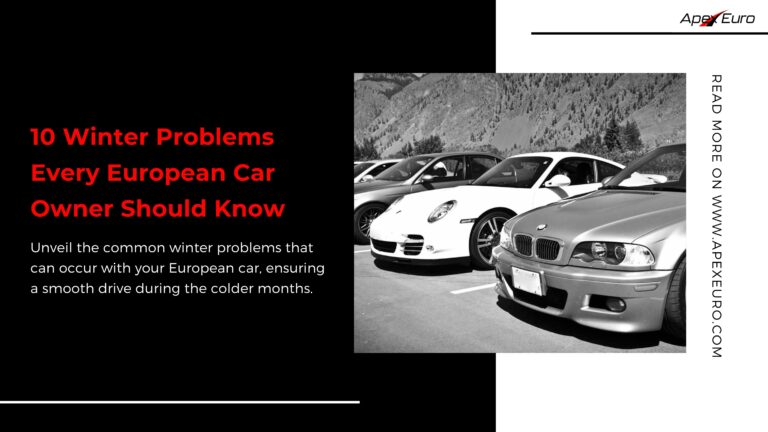Understanding Winter Troubles
- The Unique Challenges of Colder Months
Winter doesn’t play fair, especially with our vehicles. Lower temperatures, icy roads, and snow can turn minor issues into major inconveniences.
- Why European Cars Face Winter Vulnerabilities
European cars, with their refined designs and specific functionalities, may be more sensitive to extreme cold. Their unique build and specifications might sometimes make them vulnerable to certain winter-specific challenges.
Common Winter Problems That Can Occur with Your European Car
- Battery Issues in the Cold
Cold temperatures can be a battery’s worst enemy, causing it to drain faster or even freeze.
- Oil Viscosity and Temperature Sensitivity
In the winter, oil thickens. For European cars, which often use specific oil types, this can mean reduced efficiency and potential engine damage.
- Tire Pressure Drops and Related Challenges
As temperatures drop, so does tire pressure, affecting traction and fuel efficiency.
- Brake Functionality in Icy Conditions
Icy conditions can severely affect brake performance, a key safety concern for all drivers.
- The Impact of Salt on European Car Bodies
Road salt, though essential for safety, can be corrosive to the car body, especially the undercarriage.
- Defroster and Heater Malfunctions
Nothing’s worse than a malfunctioning heater on a freezing day. This common winter problem can affect comfort and safety.
Preventive Measures for Winter Problems
- Winterizing Your European Car
Taking preventive measures like adding antifreeze and ensuring good tire tread can save you from major winter woes.
- The Importance of Regular Maintenance Checks
Routine checks can help identify and rectify potential issues before they escalate during winter.
- Optimal Tire Choices for Snowy Terrains
Winter tires or all-season ones? The choice can make a difference in how your European car handles snowy terrains.
- Ensuring Fluid Levels and Quality
From brake fluid to windshield wiper fluid, ensuring the right levels and quality is crucial during colder months.
- Preventing Salt Damage: Cleaning and Waxing
A good wash and wax routine can act as a shield against the harmful effects of road salt.
Navigating Emergencies
- Steps to Take if Stranded in Snow
Being stranded is daunting, but having a clear action plan can be a lifesaver.
- Contacting Roadside Assistance in Europe
Know your options and have essential numbers handy for any unforeseen roadside emergencies.
- Keeping an Emergency Kit in Your Car
From a blanket to a flashlight, a well-stocked emergency kit is a winter essential for European car owners.
Personal Stories & Insights
- How I Managed a Snowy Breakdown
Sharing personal experiences provides a touch of authenticity to the topic, giving readers relatable stories.
- The Time My Brakes Gave Out on Ice
Such stories serve as cautionary tales, reminding drivers of the importance of preventive measures during winter.
- Lessons from a European Winter Road Trip
Traveling across Europe during winter presents its own set of challenges. By sharing lessons and experiences, we can help others prepare for their own adventures.
FAQs
1. How often should I check my European car’s battery during winter?
Regular checks, especially as temperatures start to dip, can help prevent unexpected breakdowns. It’s advisable to inspect your battery at least once a month during winter.
2. Are European cars more susceptible to winter damage compared to others?
Not necessarily. While European cars have their unique specifications, proper maintenance can ensure they face winter just as effectively as any other vehicle.
3. What type of oil should I use for my European car in winter?
It’s best to consult your car’s manual or a mechanic. However, synthetic oils generally perform better in colder temperatures.
4. How can I protect my car’s paint from road salt?
Regular cleaning and applying a good-quality wax can protect your car’s paint from the corrosive effects of road salt.
5. Is it necessary to use winter tires on a European car?
While not always mandatory, winter tires provide better traction on icy and snowy roads, enhancing safety.
6. Why is my car’s heater not working efficiently?
Heater issues could arise from various reasons, including a malfunctioning thermostat, low coolant levels, or issues with the heater core. Consulting a mechanic would be the best approach.
Owning a European car is a matter of pride for many. These vehicles, known for their class, performance, and design, are a joy to drive. However, like all cars, they have their vulnerabilities, especially during the harsh winter months. By being aware of common winter problems and taking preventive measures, you can ensure that your European car remains in top-notch condition, no matter how cold it gets.
Remember, knowledge is power. The more you’re aware of potential issues and their solutions, the better equipped you’ll be to tackle any winter challenge head-on. Safe driving!
